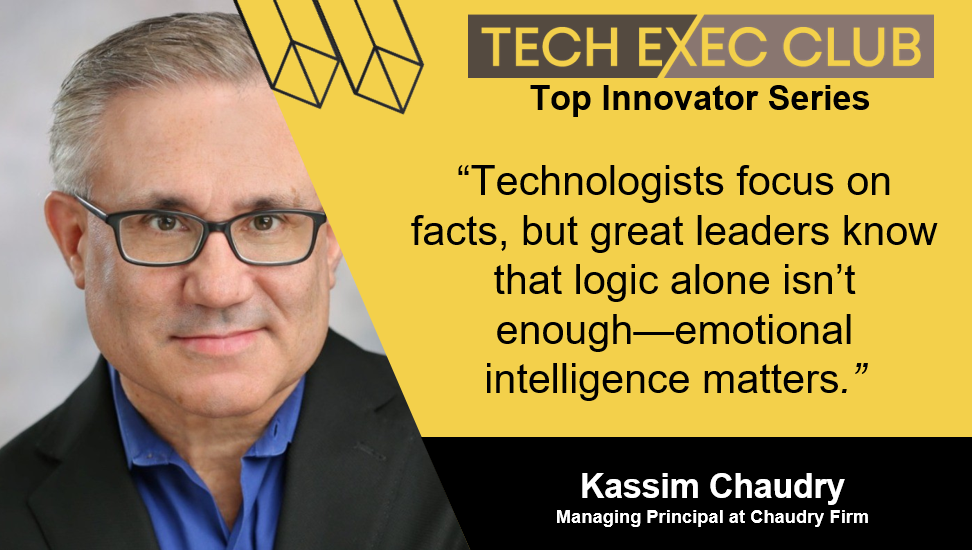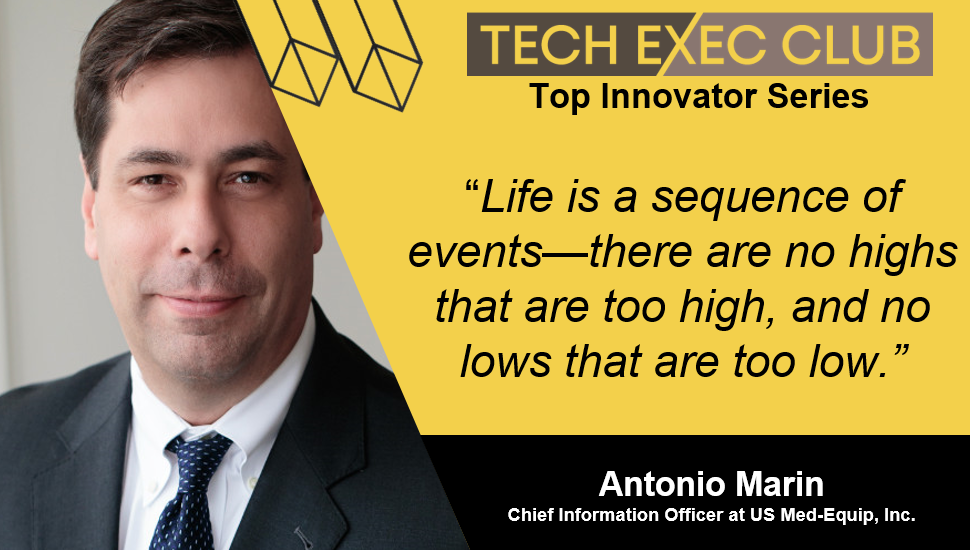In today’s fast-paced digital landscape, effective leadership in cybersecurity is more crucial than ever. Few individuals understand this better than Bill Kintz, CEO of Cayo Loco Consulting. With an impressive career spanning executive roles in the United States Coast Guard and the private sector, Bill has honed a leadership philosophy rooted in trust, collaboration, and proactive decision-making.
In this exclusive interview for the Top Innovator Series, host Josef Martens dives deep into Bill’s leadership journey, uncovering the insights and strategies that have shaped his career. From assembling high-performance teams to navigating the complexities of cyber threats, Bill shares invaluable lessons on building trust, fostering innovation, and maintaining a bias for action—ensuring leaders don’t hesitate when uncertain.
Join us as we explore the leadership principles that have guided Bill’s success, revealing actionable strategies for executives, managers, and aspiring leaders looking to impact cybersecurity and beyond.
Leadership Is a Team Sport: The Power of Trust
Leadership is often romanticized as an individual pursuit, a test of intelligence, decisiveness, and expertise. But Bill Kintz sees it differently. In his experience leading Coast Guard operations and private-sector cybersecurity teams, success has never been about standing alone—it has always been a team effort built on trust.
“The people you surround yourself with define your success,” Bill explains. “Without trust—without assembling a team that believes in each other—you won’t get very far.”
Trust is the foundation of collaboration, a force multiplier that elevates good teams into great ones. When trust is strong, people feel safe taking risks, making decisions, and speaking openly, knowing their leader and teammates have their backs. Organizations are plagued by hesitation, miscommunication, and missed opportunities without trust.
Bill believes that building trust goes beyond words—it requires consistent action. Leaders must show reliability, fairness, and support day after day. They must earn trust by demonstrating it first, ensuring their team knows they won’t be thrown under the bus for making tough calls or pushing boundaries.
And it’s not just about employees trusting their leader—leaders must trust their employees in return. Bill emphasizes empowering his team, giving them the confidence to make decisions, solve problems, and operate independently.
At the heart of it all, Bill sees trust as the glue that holds a high-performance team together. Leadership isn’t about commanding—it’s about creating an environment where people trust one another enough to push beyond their limits, embrace challenges, and achieve more than they ever could.
Hiring for Mindset, Not Just Technical Skills
Cybersecurity is often considered a field driven by technical expertise—certifications, coding skills, and deep knowledge of security protocols. But Bill Kintz challenges this traditional view. For him, the most essential qualities in a cybersecurity professional aren’t technical—they’re mindset, communication, and problem-solving skills.
“The technical stuff is the easiest part to teach,” Bill explains. “What matters is how someone communicates, solves problems, and responds under pressure.”
While certifications can indicate basic competence, they don’t reveal a person’s ability to adapt, collaborate, and think critically. Bill has seen firsthand that some of the most technically skilled professionals struggle to make quick, thoughtful decisions or explain complex concepts to non-technical stakeholders.
That’s why Bill emphasizes mindset evaluations in the hiring process. One of his favorite
techniques is asking curve ball questions to see how candidates react—questions that force them to think creatively rather than rely on pre-learned knowledge.
For example, he often asks, “How would you estimate the weight of the Empire State Building?”
Some candidates immediately search online for an answer. Others break the problem down logically—considering the number of floors, materials used, and engineering blueprints. The question isn’t about getting the correct answer—it’s about seeing how candidates approach uncertainty.
Bill believes that hiring people with strong critical thinking and communication skills ensures that a team will be agile, resilient, and ready for challenges that don’t yet exist. In an industry as fast-moving as cybersecurity, a strong mindset matters more than any certification ever could.
Servant Leadership: Leading by Example
Leadership is often associated with authority—giving orders, making decisions, and setting expectations. However, Bill Kintz believes that the most effective leaders do something radically different: they serve their teams instead of commanding them. His leadership philosophy was shaped by a defining moment aboard the Coast Guard Cutter EAGLE, a historic tall ship for training cadets.
During his time on the cutter, cadets were required to polish brass fixtures before important port visits. The brass had to shine even deep in the engine room, where no visitors would see it. It was a tedious, thankless task—until something unexpected happened.
“The Commanding Officer, a senior captain, came into the engine room and started polishing brass alongside us,” Bill recalls. “That moment changed everything for me. Leadership isn’t about rank—it’s about service.”
That experience cemented his belief in servant leadership—the idea that great leaders work for their teams, not the other way around. This translates to providing support, creating opportunities, and ensuring employees feel valued and empowered in the corporate world. Leaders who take this approach don’t just earn respect—they inspire teams to perform at their highest level.
Bill has seen firsthand how leaders, support, and hands-on create leaders stronger, more resilient teams. When people know their leader truly has their back, they are willing to take risks, push boundaries, and trust their leadership when servant leadership isn’t just a philosophy—it’s the key to building a culture of collaboration, trust, and success.
A Bias for Action: Moving Forward in Uncertainty
Hesitation can be the downfall of leadership. Bill Kintz learned one of his most powerful leadership lessons from two esteemed admirals in the U.S. Coast Guard—Admiral Thad Allen and Admiral Kevin Lundy. Their advice was simple but transformative:
“Lean forward with a bias for action.”
In leadership, it’s common to wait for clarity and analyze every possibility before deciding. But Bill knows that hesitation can lead to disaster-moving environments like cybersecurity and critical infrastructure protection, so instead of waiting for the perfect plan, he encourages his teams to move forward with confidence—even when uncertainty remains.
“In cybersecurity, as in leadership, you will never have all the answers,” Bill explains. “But standing still is never an option. Taking the initiative is better than doing nothing.”
A bias for action isn’t about recklessness but decisiveness, adaptability, and trust. Leaders who embrace this mindset foster responsive, agile teams that approach challenges proactively rather than reactively. A key component of this approach is ensuring that employees know they are supported when making tough decisions. If team members trust that leadership has their back, they’ll feel more confident taking action, even in imperfect circumstances.
This philosophy has shaped how Bill manages cybersecurity risks, strategic decision-making, and team dynamics. Instead of overthinking, his teams stay flexible, make informed choices, and course-correct as necessary.
Leadership is not about waiting—it’s about forward momentum. Bill’s bias for action ensures that teams are always moving, improving, and prepared to face the next challenge head-on.
Bridging the Gap: Becoming Multilingual in Business and Cybersecurity
One of the biggest challenges in cybersecurity leadership isn’t just the threats themselves—it’s communication. Too often, security professionals, executives, and finance teams operate in separate worlds, speaking different “languages” that lead to misunderstandings, misalignment, and inefficiencies. Bill Kintz has made it a mission to bridge this gap by becoming “multilingual”—not in spoken languages, but in business, tech, and finance cultures.
Bill specializes in industrial control system security, a field critical to infrastructure protection but often misunderstood outside IT. Through experience, he’s found that many business leaders don’t fully grasp cybersecurity risks, while security teams struggle to articulate threats so executives can act. Without strong communication, organizations end up reactive rather than proactive, failing to integrate cybersecurity into broader strategic goals.
For Bill, effective leadership means translating technical issues into actionable business insights. Cybersecurity isn’t just an IT function—it’s a business imperative that impacts financial stability, operational efficiency, and customer trust. By learning to communicate fluently across disciplines, security leaders can foster collaboration, drive informed decision-making, and strengthen defenses before an attack happens.
Ultimately, bridging the language gap between departments isn’t just about more precise communication—it’s about ensuring cybersecurity becomes a seamless part of business strategy. Bill believes that the future of leadership in this space lies not in technical expertise alone but in the ability to bring people together under a shared vision—one where security, business, and finance work hand in hand.
Leadership in cybersecurity and any field is not just about expertise; it’s about mindset, trust, and action. Bill Kintz’s insights provide a roadmap for executives, managers, and professionals looking to sharpen their leadership skills and strengthen their teams. Here’s how you can apply these principles to your leadership journey:
1. Prioritize Trust and Teamwork: Foster an environment where trust is the foundation of collaboration. Surround yourself with individuals who challenge and support you—leadership is a team sport. Engage in open communication and create spaces where employees feel empowered to contribute ideas.
2. Hire for Soft Skills, Not Just Technical Expertise: Evaluate candidates beyond their certifications—look for adaptability, creativity, and problem-solving skills. Ask unexpected questions during interviews to assess critical thinking and pressure responses. Invest in ongoing leadership training to refine team communication and interpersonal skills.
3. Embrace Servant Leadership: Lead by example—step into the trenches with your team when needed. Create a “top cover” culture where employees know leadership will support and protect them. Encourage mentorship and empowerment, ensuring your team knows they work with you, not for you.
4. Develop a Bias for Action: Make decisions confidently—even in uncertainty, action is better than hesitation. Instill a proactive mindset in your team that values forward momentum over perfection—reward initiative and problem-solving instead of penalizing calculated risks.
5. Become Multilingual in Business and Technology: Strengthen your ability to communicate across departments—speak the language of tech, business, and finance. Break down silos and align cybersecurity strategies with business objectives. Educate stakeholders to ensure cybersecurity is understood as a fundamental business function, not an isolated technical concern.
Leadership is not a title—it’s an action. Whether you’re building a cybersecurity strategy or leading a high-performance team, Bill Kintz’s principles can help you drive change and make a lasting impact.
Bill Kintz’s leadership philosophy is rooted in trust, action, and service—principles that extend beyond cybersecurity and into every facet of effective leadership. His journey from the U.S. Coast Guard to the private sector has shaped his ability to build high-functioning teams, prioritize soft skills over technical expertise, and embrace servant leadership.
More than just a cybersecurity expert, Bill is a visionary leader who understands that success comes from empowering others. His commitment to bridging communication gaps between tech, business, and finance is a testament to his belief that authentic leadership is about alignment, clarity, and collaboration.
As he looks toward the future, Bill remains dedicated to sharing his expertise, enabling the next generation of leaders, and ensuring that organizations remain resilient in the face of evolving threats. His legacy is not just in the strategies he implements but in the people he inspires to lead with confidence, trust, and a bias for action. The question now is: How will you apply these leadership principles to your journey?
Want to hear Bill Kintz’s insights firsthand? Watch the full, live podcast interview [click here]





